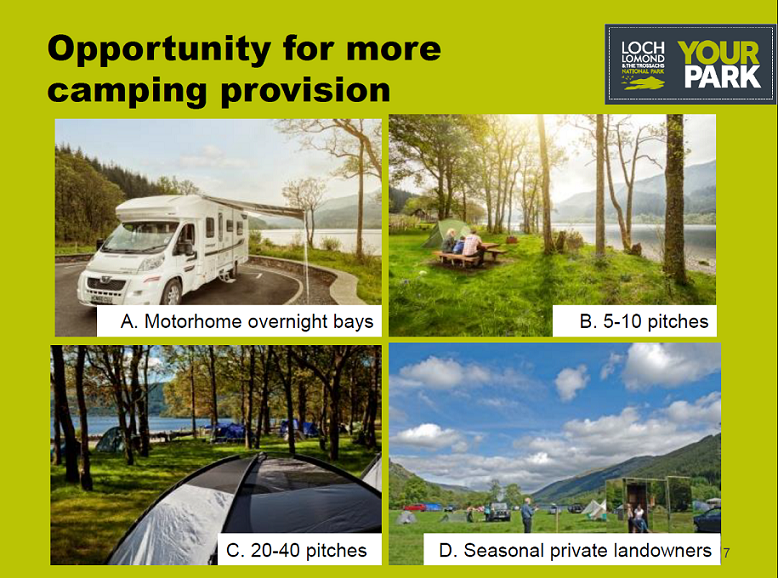
Regular readers will not be surprised to hear that the Information Commissioner wrote to me on 11th January (see here) to say that they had ascertained that the Loch Lomond and Trossachs National Park holds more information about its secret Board “Briefing” sessions which it failed to declare. The Information Commissioner had previously required the Park to make public all but one of the slides (example above) presented to the Board (see here). The slides, the Park had claimed, were the only information it held from the Secret Board discussions which developed the byelaws. The Information Commissioner has now told the Park to make the additional information public and asked them to apologise to me by the end of the month. I have not yet had either the information or the apology.
The Information Commissioner’s letter is worded very carefully but is revealing about the LLTNPA’s disregard for the truth and due process. The Information Commissioner’s staff, who I cannot praise highly enough, have tried to find out why the Park failed to declare to them this information. That information should have been provided as part of my appeal into the Park’s refusal to disclose any information from the 10 Secret Board Briefing Sessions. The way the process is supposed to work is that if a public body wishes to withhold information, the Information Commissioner’s staff look at that information, and then decide whether or not it should be in the public realm. The whole process is dependant on the public body being honest enough to declare the information it holds in the first place.
In the case of the LLTNPA, it clearly wasn’t honest and open with the Commissioner. The main reason I believe the Information Commissioner has been able to investigate this further was not the obvious gaps in the information provided (why was there information for some meetings but not others?) (see here) but because I provided them with a written agenda and briefing from the Secret Board Briefing session in April 2015 (see here). This set out for the Board what interests the Convener of the National Park, Linda McKay, should declare at the public Board Meeting later in the day which “approved” the camping byelaws. It had been obtained by the Commissioner for Ethical Standards as part of their investigation into Board Members failure to declare ownership of property within the proposed camping management zones and subsequent fiddling of the minute of that meeting. The LLTNPA however never gave it to the Information Commissioner.
Moreover, the reason the LLTNPA has given for not providing this further information about the Board “Briefing” Sessions to the Information Commissioner is laughable. The LLTNPA apparently tried to claim that they intepreted my request too narrowly – I had asked for ALL written information relating to those briefing sessions – and that they “wrongly assumed all information and documentation” relating to my request was held at a central location. Now it defies belief that the current Chief Executive, Gordon Watson, was not fully aware of the information request which concerned the operation of his Board. Moreover, Gordon Watson previously had lead responsibility for the development of the byelaws and it also defies belief that he did not attend most or all of those Briefing Sessions. He therefore must know what written information had been produced for and about those meetings, even if he could not remember all the details. He could therefore have told staff where to find it. He clearly didn’t and the question that needs to be answered is why not? The case provides yet another example of the cover-up and conspiracy that lies behind the camping byelaws.
What needs to happen
Unfortunately the Information Commissioner does not have the powers to deal with situations like this, where it appears that senior staff in public authorities are undermining the intentions behind our freedom of information laws – which were increasing the transparency about how public bodies operate and take decisions. It appears to me therefore that there is a very strong case for the Information Commissioner to be given further powers to conduct widescale investigations into public authorities in cases such as this and to be able to order improvements.
While I cannot see the Park investigating their own serious failures while Linda McKay remains convener, there will be a new convener from 1st March, James Stuart, who has hinted he considers there is a need for a change of course. A good start would be to get the Board to change the way it operates:
- End the practice of secret Board Briefing Sessions and replace these with public Board Meetings
- Record and broadcast all Board Meetings as per the Scottish Parliament
- Publish papers for Board Meetings at least a week beforehand (not three days) and publish agendas at least two weeks in advance to enable the public to know what will be discussed
- Issue draft minutes of all meetings within two weeks of them taking place so the public know what decisions have been made
2 Comments on “The camping cover up and and reform of the Loch Lomond and Trossachs National Park”